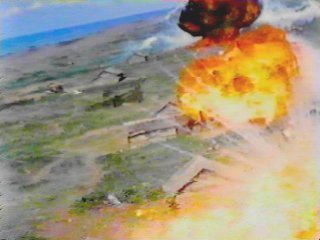Viet-wha?

One of the privileges of being American is that we can remember what we want about what we've done any damn way we like. Revisionism and self-delusion are Constitutional rights. Funhouse mirrors flatter us. American history exists solely to let us off whatever hook we're currently caught on.
Not long ago, while visiting a local relative, a college-age female friend of the relative's daughter went off on a mystical rant about America, none of it fact-based, her eyes misting as she spoke of the Archangel Gabriel guiding Ronald Reagan's hand to free the slaves, or something like that. It was all mush. She then stood up and declared, "And that's why I'm a history major! Because I love America!"
Out of courtesy to our host, I suppressed the urge to engage the young woman in a real historical discussion, just to get a sense of how much she really knew. But I did feel kind of sick. Was this typical of most college students? I doubted it, but then, living in a college town, I've overheard some pretty stupid conversations between students who somehow got into one of the nation's leading universities. Having not gone to college myself, there may be academic subtleties I've missed. But more often than not, I'm reminded of that wonderful scene in "Good Will Hunting" where Matt Damon's Will takes apart some Harvard asshole in a bar, reminding him that "you dropped a hundred and fifty grand on an education you coulda' picked up for a dollar fifty in late charges at the Public Library."
Still, it's not really those young students' fault, not when the mainstream culture encourages and rewards historical amnesia and selective memory. For example, I'm certain that in order to get a writing job at USA Today, you must at least hold a Bachelor's Degree, probably in journalism. And when you are assigned to report on, say, the 30th anniversary of the US pulling out of Vietnam, you must stick to a very worn, comforting script, as Steven Komarow did in today's edition.
Reading this piece, one would not get the idea that the US, over a 13-year period, pounded and ripped apart Vietnam in every imaginable -- and in some cases, unimaginable -- way, slaughtering millions, maiming tens of thousands, then expanding this aggression to Cambodia and Laos, that latter of which, in the Plain of Jars, remains an active minefield, thanks to the millions of cluster bomblets (courtesy of Honeywell) dropped there. You wouldn't remotely sense that the US assault on Vietnam was one of the 20th century's bloodiest and most destructive wars.
No.
What we get instead are sanitized remembrances from a limited group of witnesses. There's no mention of the antiwar movement, nor a nod to antiwar Vietnam vets who came away from that nightmare with rather darker tales to tell. Not even a take from those Vietnamese who resisted our attack (and who, surviving the hell-on-Earth we created in their country, are remarkably forgiving of us). Nothing of the kind is allowed in Komarow's piece. Instead, we're handed the standard story about how our motives were pure but sometimes purity of heart is not enough, etc. That the "real" lesson of Vietnam is that when we do choose to attack another country, we must do it quickly and efficiently -- kill fast, then leave ASAP. Well, if that's the "real" lesson, then we haven't learned dick, if Iraq is any indication.
So it goes. In retrospect, I was probably too harsh in my assessment of that young history major mentioned above. Given our national inability to face the most basic facts about our conduct in Southeast Asia, she should prosper as a historian.


<< Home